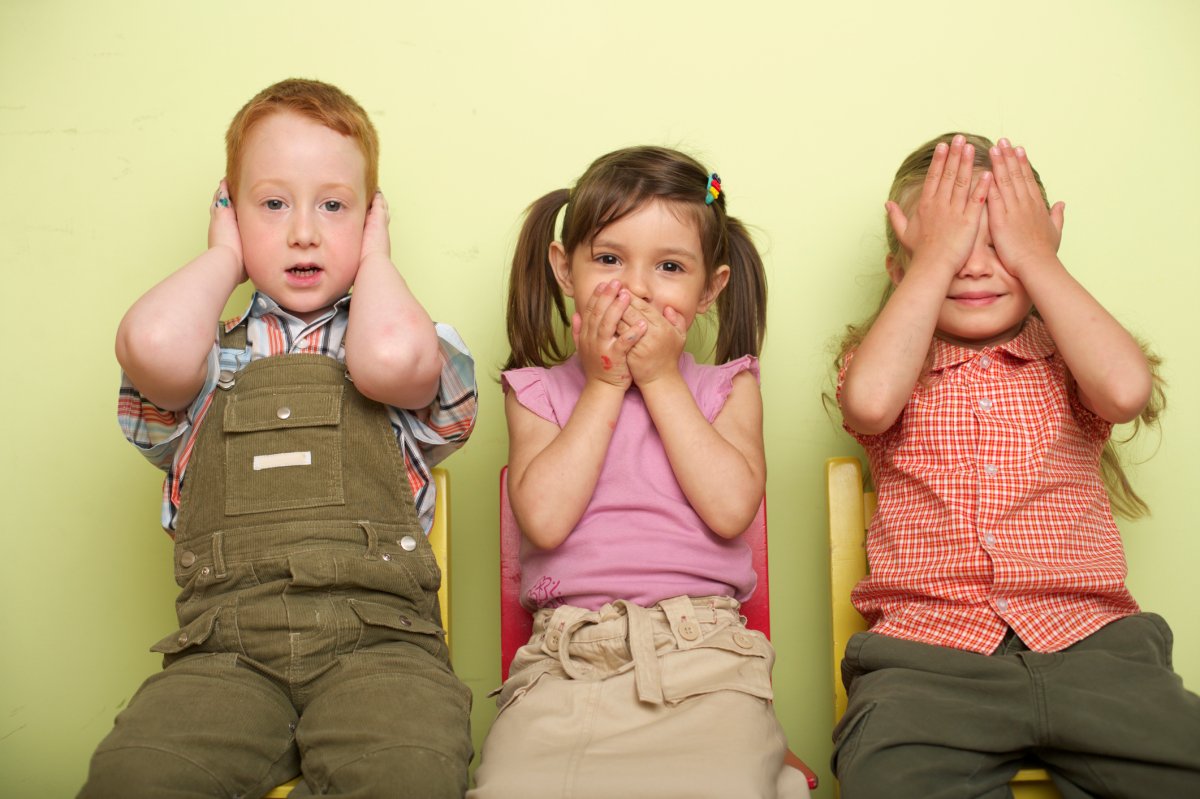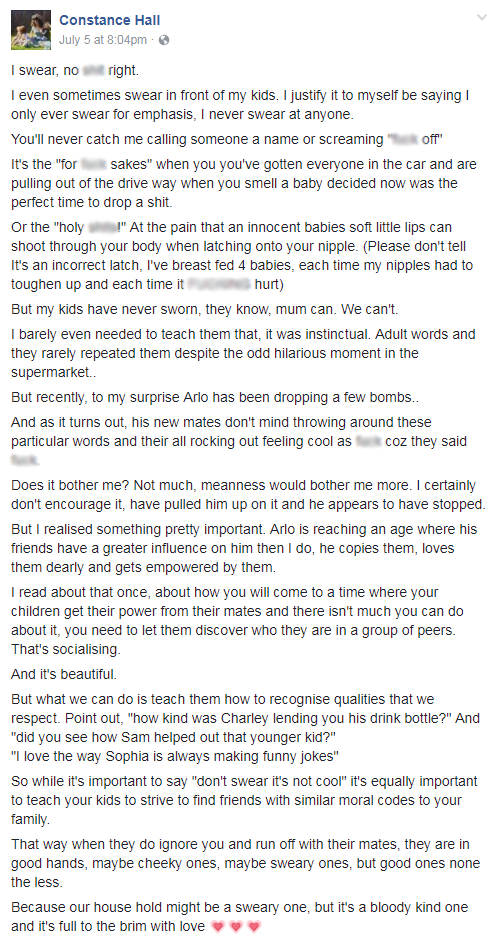Australian mommy blogger Constance Hall wants everyone to know that she swears in front of her children – and she doesn’t care what other people think.

The mom of four took to Facebook last week to share her parenting choice, explaining her reasoning behind her controversial decision to drop an F-bomb or two around her children on occasion.
READ MORE: One mom’s life lesson to her son about respect has parents applauding
“I justify it to myself by saying I only ever swear for emphasis, I never swear at anyone,” Hall wrote. “You’ll never catch me calling someone a name or screaming ‘f*** off.’ It’s the ‘for f*** sakes’ when you’ve gotten everyone in the car and are pulling out of the driveway when you smell a baby decided now was the perfect time to drop a s***.”
Despite her liberal use of swear words, Hall insists her kids haven’t picked up the habit.
But Hall does admit that one of her sons, Arlo, has been pushing the boundaries. However, she believes that his friends have had more of an impact on his swearing than she has.
“I realized something very important,” she wrote. “Arlo is reaching an age where his friends have a greater influence on him than I do. He copies them, loves them dearly and gets empowered by them.”
So her advice to parents? Merely telling your child not to swear isn’t going to do the trick, it’s also helping them find friends who are positive influences.
“So while it’s important to say ‘don’t swear it’s not cool’ it’s equally important to teach your kids to strive to find friends with similar moral codes to your family,” Hall said. “That way when they do ignore you and run off with their mates, they are in good hands, maybe cheeky ones, maybe sweary ones, but good ones nonetheless.”
For parenting expert Alyson Schafer, while the mom’s decision to swear in front of her kids isn’t ideal, this is just another example of parents being put under the microscope.
“This just goes to speak to the whole parent shaming thing,” Schafer says. “We’re still scrutinizing every little thing that we do.”
However, Schafer is concerned about the message mom might be sending.
- Canadian man dies during Texas Ironman event. His widow wants answers as to why
- Several baby products have been recalled by Health Canada. Here’s the list
- ‘Sciatica was gone’: hospital performs robot-assisted spinal surgery in Canadian first
- Canadian food banks are on the brink: ‘This is not a sustainable situation’
“To say that swearing is part of the adult domain, like drinking wine, for example, is a dangerous contingent to present to children because when you say to your child that they can only swear when they’re older… What you do is entice them to swear because then they look like they are gaining a status with their peer group because everything ‘adult’ has stature,” she says. “Kids want to grow up so badly. They want to move out of their perceived position of inferiority to adults and they want to be grown up.”
READ MORE: What we can learn about temper tantrums from this dad’s social media post
Not all children will repeat after their parents, but if a curse word does slip out at one point, then Schafer says the moment becomes a great learning opportunity.
“Say, ‘Oh, it looks like you’ve learned a new word,’ and ask them if they know what it means,” says Schafer. “It’s amazing how much they don’t know, they just heard someone say it. Often they’ll say it when they’re quite young and it will be out of context. They really don’t know what it means – they just know that they’ve stirred up a commotion. Sometimes they’ll say it in front of their parents too to find out if it’s OK or not OK.”
Also, ask the child where they’ve heard the word and explain to them why that particular word might hurt or offend people or get them into trouble, Schafer adds.
“Take the educational approach,” Schafer says. “I think most times young kids want to move in line with your expectations. So you kind of are telling them that they’re mature and that you trust them to be good with that word.”
As kids grow up and become teenagers and adults, Schafer says, that’s when families can decide how such language will be dealt with in the home.
However, one cognitive scientist at UC San Diego doesn’t see the harm in swearing around children.
While he says swearing at your kids is a bad idea and should be off-limits, swearing around them is fine.
In his book What the F: What Swearing Reveals About Our Language, Our Brains and Ourselves, he argues that there is no proof that hearing everyday profanity causes any harm to children.
A 2013 study published in the American Journal of Psychology, which looked children ages one to 12, also found that swearing only rarely resulted in negative repercussions – and violence was never observed once in the observational study. Instead, researchers found curse words were mostly used for a positive reason, like humour, and not used out of anger.








Comments